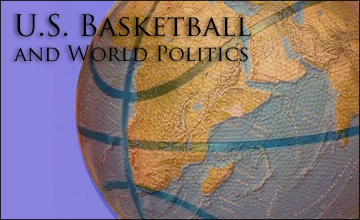Olympic Test: U.S. Basketball and Foreign Policy
Olympic Test: U.S. Basketball and Foreign Policy
tk
With the N.B.A. Finals just beginning, it’s a great time in the United States to be a basketball fan. But the real test for American basketball fans won’t come until this August, when the U.S. men’s team makes its appearance at the Beijing Olympics.
 Once upon a time, America had a lock on Olympic basketball gold. Basketball was the game that America invented and by the 1980s, it had become its cities’ most popular game with African-American players making up 75 percent of the N.B.A.’s rosters. But by 2002, Americans could no longer assume that their players were the best in the world. In that year, the U.S. basketball team failed to win a medal at the World Championship, and in succeeding years the U.S. has done only marginally better. In the 2004 Summer Olympics, the U.S. lost three games on its way to a bronze medal, and at the 2006 World Championship, the U.S. again could do no better than a bronze.
Once upon a time, America had a lock on Olympic basketball gold. Basketball was the game that America invented and by the 1980s, it had become its cities’ most popular game with African-American players making up 75 percent of the N.B.A.’s rosters. But by 2002, Americans could no longer assume that their players were the best in the world. In that year, the U.S. basketball team failed to win a medal at the World Championship, and in succeeding years the U.S. has done only marginally better. In the 2004 Summer Olympics, the U.S. lost three games on its way to a bronze medal, and at the 2006 World Championship, the U.S. again could do no better than a bronze.
In recent years these basketball failures have mirrored America’s failures in foreign affairs. Just as we have lost power and prestige as a result of the Iraq War and our stance on such issues as global warming and the U.N.’s International Court of Justice, so we have lost athletic status by virtue of our Americanized approach to international basketball.
We are out of touch with the rest of the world. It is not just that the American basketball court is different from the Olympic court with its closer three-point line and trapezoid foul lane. It is that the one-on-one American game is ill-suited to the international game, where jump shooting, team defense, and passing are the keys to winning.
Foreign stars who have come to America have no trouble adjusting to the American game. The Los Angeles Lakers depend on Spain’s Pau Gasol, the Dallas Mavericks on Germany’s Dirk Nowitzki, the Houston Rocket’s on China’s Yao Ming, the San Antonio Spurs on France’s Tony Parker and Argentina’s Manu Ginobli. The problems come when American stars go abroad as a team. They seem as lost as American carmakers trying to win over the international market with their gas-guzzling SUVs.
Under the guidance of Duke University’s coach Mike Krzyzewski, the 2008 U.S. basketball team will get a chance to show if it has learned from the recent past. If it wins the gold by committing itself to team play over the one-on-one style that wins lucrative contracts in the N.B.A., it won’t be a political triumph on the order of Jesse Owens’s track victories over German racism at the 1936 Olympics or the American hockey team’s miracle-on-ice defeat of the Soviet Union at the 1980 Olympics. But a 2008 victory will still be significant—a sign that in at least one sphere of our international life, hubris may be on the wane and team play on the rise.
Nicolaus Mills, a professor of American Studies at Sarah Lawrence College, is author of Winning the Peace: The Marshall Plan and America’s Coming of Age as a Superpower.






